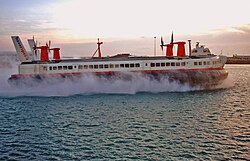Ferry

Ferry is a boat or ship that is used to take people, vehicles or goods across large bodies of water, such as seas, lakes, and rivers.
In many places around the world, ferries are very important for public transport. Some of these places can only be reached by ferry, because they have no roads or railways with bridge or tunnels that join them to nearby places, nor do they have any locations at which to land airplanes, whether it is an airport or only an airfield.
Sometimes the trip in a ferry is free and sometimes it must be paid for. Many ferries also carry cars, some even have own rail tracks, allowing the ferry to carry trains on board.
The word 'ferry' can also mean 'to take someone or something by ferry'.
The Herald of Free Enterprise disaster, in which 193 people died near Zeebrugge in 1987, was one of the worst ferry accidents of recent times. It was caused by a crew member forgetting to close the bow doors of the ferry.
Ferry Media
A catamaran off the Raja Tun Uda Ferry Terminal in George Town, Penang c. 2025
The Rialto water taxi station in Venice, Italy
Incat built Catamaran HSC Manannan entering Douglas, Isle of Man
Lorries preparing to unload from the Pont-Aven, the Brittany Ferries flagship
Turntable ferry MV Glenachulish operating between Glenelg on the Scottish mainland, and Kylerhea on the Isle of Skye. Built in 1969, she is the last manually operated turntable ferry in the world.
The Lower Kingswear to Dartmouth ferry, Devon, England. The pontoon carries eight cars and is towed across the River Dart by a small tug. Two ropes connect the tug to the pontoon.
Other websites
![]() Media related to Ferries at Wikimedia Commons
Media related to Ferries at Wikimedia Commons









